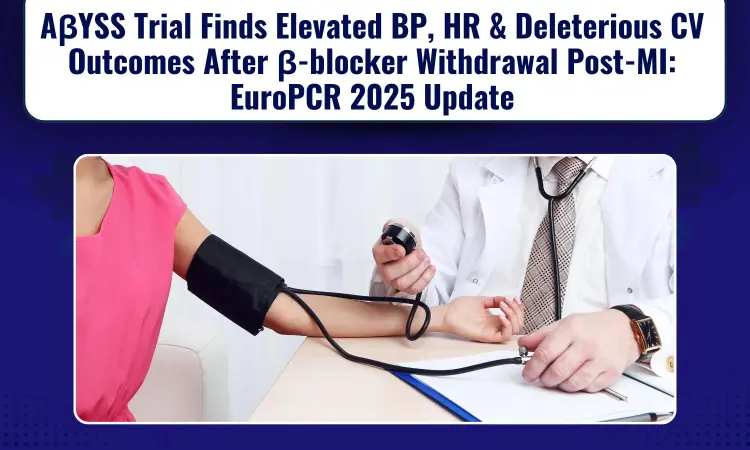- Home
- Medical news & Guidelines
- Anesthesiology
- Cardiology and CTVS
- Critical Care
- Dentistry
- Dermatology
- Diabetes and Endocrinology
- ENT
- Gastroenterology
- Medicine
- Nephrology
- Neurology
- Obstretics-Gynaecology
- Oncology
- Ophthalmology
- Orthopaedics
- Pediatrics-Neonatology
- Psychiatry
- Pulmonology
- Radiology
- Surgery
- Urology
- Laboratory Medicine
- Diet
- Nursing
- Paramedical
- Physiotherapy
- Health news
- Fact Check
- Bone Health Fact Check
- Brain Health Fact Check
- Cancer Related Fact Check
- Child Care Fact Check
- Dental and oral health fact check
- Diabetes and metabolic health fact check
- Diet and Nutrition Fact Check
- Eye and ENT Care Fact Check
- Fitness fact check
- Gut health fact check
- Heart health fact check
- Kidney health fact check
- Medical education fact check
- Men's health fact check
- Respiratory fact check
- Skin and hair care fact check
- Vaccine and Immunization fact check
- Women's health fact check
- AYUSH
- State News
- Andaman and Nicobar Islands
- Andhra Pradesh
- Arunachal Pradesh
- Assam
- Bihar
- Chandigarh
- Chattisgarh
- Dadra and Nagar Haveli
- Daman and Diu
- Delhi
- Goa
- Gujarat
- Haryana
- Himachal Pradesh
- Jammu & Kashmir
- Jharkhand
- Karnataka
- Kerala
- Ladakh
- Lakshadweep
- Madhya Pradesh
- Maharashtra
- Manipur
- Meghalaya
- Mizoram
- Nagaland
- Odisha
- Puducherry
- Punjab
- Rajasthan
- Sikkim
- Tamil Nadu
- Telangana
- Tripura
- Uttar Pradesh
- Uttrakhand
- West Bengal
- Medical Education
- Industry
ABYSS Trial Finds Elevated BP, HR & Deleterious CV Outcomes After Beta blocker Withdrawal Post-MI: EuroPCR 2025 Update

Discontinuing Beta-blocker therapy after an uncomplicated myocardial infarction (MI) was found to cause a persistent rise in blood pressure (BP) and heart rate (HR), with potentially harmful effects on clinical outcomes, particularly in patients with a history of hypertension, as highlighted by the ABYSS trial.
The study was published in the May 2025 Issue of the European Heart Journal, and also presented at the EuroPCR 2025 Conference held in Paris, France
The role of β-blockers in stable, revascularized patients with uncomplicated myocardial infarction and preserved left ventricular ejection fraction (LVEF) remains uncertain. Recent guidelines suggest discontinuing them after the acute phase if there is no heart failure or left ventricular (LV) dysfunction, though their effect on heart rate (HR) and blood pressure (BP) as key prognostic factors in coronary artery disease keeps their use relevant. The European Society of Hypertension and the European Society of Cardiology recommend β-blockers for hypertension only when specific conditions like heart failure with reduced ejection fraction (HFrEF), chronic coronary syndromes, or atrial fibrillation are present.
Given this uncertainty, AβYSS trial was conducted, which is a multicentre, randomized, open-label, non-inferiority trial, to evaluate the impact of β-blocker interruption on blood pressure (BP) and heart rate (HR) in patients with a prior myocardial infarction and preserved LVEF.
A total of 3,698 patients at least six months post-myocardial infarction, on β-blocker therapy, and without chronic heart failure or reduced LVEF (<40%) were enrolled and randomized to either continue (n=1,852) or discontinue (n=1,846) β-blockers. Changes in heart rate and blood pressure from baseline were analyzed using a linear mixed repeated model over a median follow-up of 3 years. The study also assessed these changes and their association with the primary endpoint (death, MI, stroke, hospitalization for cardiovascular reason) in subgroups with or without a history of hypertension using linear mixed repeated and adjusted Cox proportional hazards models.
The key results from the study include:
- Impact of β-blocker interruption or continuation on haemodynamics in the randomized groups: At 6 months, patients in the β-blocker interruption group showed a significant increase in resting heart rate (+9.8 bpm, P < .001), systolic BP (+3.7 mmHg, P < .001) and diastolic BP (+3.3 mmHg, P < .001), compared to the continuation group (all P < .001). These effects remained stable over time, despite more frequent use and dose escalation of other antihypertensive drugs in the interruption group (10.8% vs 4.0%).
- Comparison of patients with a prior history of hypertension vs. no prior hypertension: The haemodynamic impact of β-blocker interruption was consistent across patients with or without a history of hypertension. However, hypertensive patients had a higher incidence of the primary outcome [25.8% vs 19.2%; adjusted HR (Hazard Ratio) 1.18, P = .03], identifying them as a higher-risk group. The harm from β-blocker interruption appeared more pronounced in hypertensive patients [risk difference 5.02%, adjusted HR 1.23, P = .04], primarily driven by increased hospitalizations for cardiovascular causes, including coronary events, heart failure, and supraventricular tachycardia. Despite this, the overall effect of interruption was consistent across both subgroups (interaction P = .26).
The findings suggest that interrupting β-blockers beyond 6 months in stable post-myocardial infarction patients leads to a sustained increase in systolic and diastolic blood pressure and heart rate, posing potential long-term risks, especially in those with a history of hypertension.
Reference: Niki Procopi, Michel Zeitouni, Mathieu Kerneis, Guillaume Cayla, Emile Ferrari, Grégoire Range, Etienne Puymirat, Nicolas Delarche, Paul Guedeney, Farzin Beygui, Laurent Desprets, Jean-Louis Georges, Thomas Bochaton, François Schiele, Grégory Ducrocq, Marie Hauguel-Moreau, Raphaelle Dumaine, Michel S Slama, Laurent Payot, Mohamad El Kasty, Karim Aacha, Abdourahmane Diallo, Xavier Girerd, Eric Vicaut, Johanne Silvain, Gilles Montalescot, on behalf of the AβYSS Investigators of the ACTION Study Group, Beta-blocker interruption effects on blood pressure and heart rate after myocardial infarction: the AβYSS trial, European Heart Journal, 2025;, ehaf170, https://doi.org/10.1093/eurheartj/ehaf170
BDS, MDS(orthodontics)
Dr. Garima Soni holds a BDS (Bachelor of Dental Surgery) from Government Dental College, Raipur, Chhattisgarh, and an MDS (Master of Dental Surgery) specializing in Orthodontics and Dentofacial Orthopedics from Maitri College of Dentistry and Research Centre. At medical dialogues she focuses on dental news and dental and medical fact checks against medical/dental mis/disinformation


